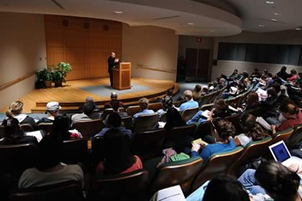
Catherine Perry is teaching a French course called Contemporary Topics this semester. Todd Hill, an Instructor in Management at Mendoza, is teaching a class called Project Management. Anselma Dolcich-Ashley of the Theology Department teaches Foundations of Theology as well as a second level theology course.
These disparate classes have something surprising in common: they all have an important focus on sustainability. While most students expect to find such a focus in classes in departments such as Biology, Civil and Environmental Engineering, Political Science, Economics, and others, more and more classes with sustainability themes are popping up farther afield.
“I am particularly interested in how our food choices affect the environment,” said Perry, a professor in the Department of Romance Languages and Literatures. “We’ll be watching a documentary titled Nos enfants nous accuseront (Food Beware: The French Organic Revolution). I’m also planning to show the documentary Solutions locales pour un désordre global (Local solutions for a global disorder) and the feature film La Belle Verte (The green beautiful), with the intent to help us think more about sustainability as a class.”
“Sustainability projects add value to the student experience because they focus on real world issues that will affect not only them, but their future children and grandchildren,” said Hill, who has taught Project Management for three years. “At Notre Dame, we talk about stewardship and our time horizon is not 3, 5, or even 10 years, but tens and even hundreds of years. Notre Dame is the Notre Dame of today because of decisions that were made by people like Fr. Sorin and Fr. Hesburgh.”
The teachings of environmental ethics and sustainability are not only a part of Anselma’s theology classes, they are integral, she says. “The natural world is not simply instrumental – that is, existing only to point to God, or to teach us about God – but is itself God’s point, as the Scriptures describe God’s delight in creation (Proverbs 8:30-31), God’s setting aside time to celebrate creation’s goodness (Genesis 1:31-2:3), and God’s eternal dwelling in the ‘new earth’ (Revelation 21:1-4), ” said Dolcich-Ashley.
The interdisciplinary nature of the sustainability movement and the natural and societal challenges it addresses means that a course in virtually any field can incorporate sustainability. “In some fields the connections are less obvious, and you really have to think outside the box,” said Rachel Novick in the Office of Sustainability, “but that’s what gets students really excited – by approaching a subject they thought they knew from a fresh angle.”